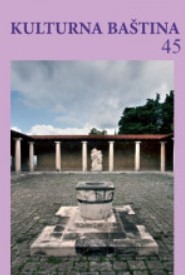STUDENTI IZ SPLITA NA MUDROSLOVNOM FAKULTETU KR. SVEUČILIŠTA FRANJE JOSIPA I. U ZAGREBU (1874. – 1914.)
STUDENTS FROM SPLIT AT THE FACULTY OF PHILOSOPHY (MUDROSLOVNI FAKULTET) OF THE ROYAL UNIVERSITY OF FRANZ JOSEPH I IN ZAGREB (1874-1914)
Author(s): Tihana LuetićSubject(s): Social history, Higher Education , History of Education, 19th Century, Pre-WW I & WW I (1900 -1919)
Published by: DRUŠTVO PRIJATELJA KULTURNE BAŠTINE - SPLIT
Keywords: higher education; students; Split; University of Zagreb; Faculty of Philosophy; social history; 19th century; 20th century;
Summary/Abstract: Based on the enrollment records from the Archives of the Faculty of Humanities and Social Sciences in Zagreb, this paper analyzes a group of Split natives who were students at the then Mudroslovni fakultet (Faculty of Philosophy), in the period between the establishment of a modern university in Zagreb in 1874 until the beginning of WWI in 1914. The available personal data, as well as data on their education, were analyzed through a quantitative method in order to determine their social status, family origins, educational background, and some of the characteristics of their student life in Zagreb. Analysis of data led to the conclusion that the total number of students from Split enrolled at the Mudroslovni fakultet in Zagreb, in the period between 1874 and 1914, is very scarce: there were 58 enrolled students, of which only 9 completed their studies in Zagreb by taking the final professorial exam. The reasons for such low numbers are various: students from Dalmatian towns traditionally studied at universities on the Apennine Peninsula and the central universities of the Austro-Hungarian Monarchy. At the moment when a modern university in Zagreb opened its doors to interested students in 1874, it still had significant limitations both in the sense of vocations offered (technical vocations and medicine were still not available at the newly founded university) and in the fact that its diplomas were not recognized in the Austrian part of the Monarchy, due to the Austrian law on the reciprocity of universities, which directly affected students from Dalmatia. The issue of reciprocity was also the main reason why these students, if they enrolled at the Zagreb University, would later transfer to another university in Austria to finish their studies (the length of their stay in Zagreb reveals that most of the students, some 28 of them, spent only one semester in Zagreb). Analysis of the personal data of enrolled students has led to the conclusion that students from Split, by their social structure, came from various social strata, but the majority were from from the families of public officials. According to their birthplace, the majority were born outside of Split, and as far as their educational background, most attended the so-called klasična gimnazija in Split, a preparatory high school with a focus on classical languages. According to the selected subjects of study, more than half were students of the natural sciences and mathematics, and most were full-time students. In any case, the number of students from Split who attended the Mudroslovni fakultet in Zagreb prior to WWI is very scarce, but these very students paved the way for future generations of students from Split who became students of the present-day Faculty of Humanities and Social Sciences in far greater numbers.
Journal: KULTURNA BAŠTINA : ČASOPIS ZA PITANJA PROŠLOSTI SPLITSKOGA PODRUČJA
- Issue Year: 2019
- Issue No: 45
- Page Range: 173-196
- Page Count: 24
- Language: Croatian

